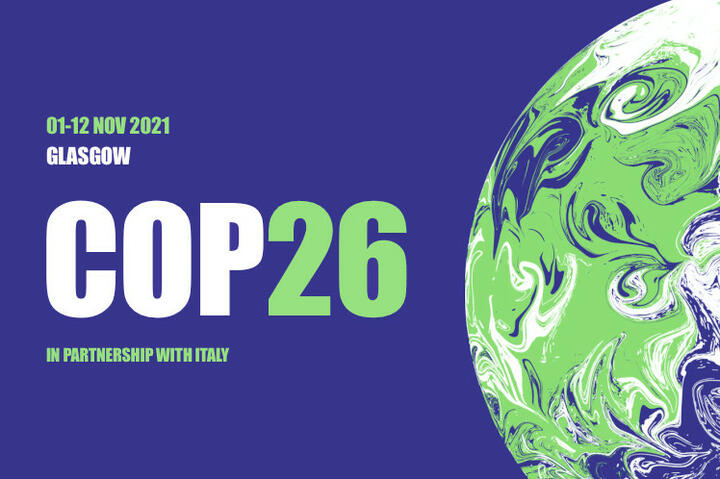Climate talks lacking knowledge of permanent global impacts from glacier and ice sheet loss
Monday 08 November, Glasgow:
 Mountain and polar groups at COP-26 are calling for more consideration of the dire global impacts that will result should governments not take greater action as the climate talks in Glasgow begin their second and final week.
Mountain and polar groups at COP-26 are calling for more consideration of the dire global impacts that will result should governments not take greater action as the climate talks in Glasgow begin their second and final week.
These research, environmental and indigenous organizations span the entire global “cryosphere” (snow and ice regions), from the poles to the high mountain Asia “Third Pole.” They believe that the real implications of this science for climate goals remain so poorly understood by governments, that an entire day should be devoted to their impacts, especially as regards thresholds and tipping points.
The groups note that despite the dire consequences noted in the IPCC’s latest report, released in August of this year, there has never been a full discussion of projected changes, especially their irreversibility at the climate talks. The UNFCCC has in the past held Dialogues on oceans and terrestrial systems or lands; but never on the Earth’s cryosphere.
“Negotiators may think they know about melting ice caps, but what they don’t realize is that the impacts are essentially permanent on human timescales, and catastrophic for humanity,” noted Dr. Robert DeConto, a leading researcher within SCAR, who attended the conference last week. “Once the collapse of the West Antarctic Ice Sheet begins, it will be effectively impossible to halt,” agrees Jonathan Bamber, Director of the Bristol Glaciology Centre and a multiple IPCC author who also attended.
“For too long, our planet’s frozen elements have been absent from the climate debate at the UNFCCC, even though their crucial role in determining the future for more than a billion people and our climate is becoming ever more clear,” said Dr. Martin Sommerkorn, IPCC SROCC author, of the WWF Arctic Programme. “The UNFCCC must urgently create space for Parties and stakeholders to discuss actions to be taken in response to this cryosphere crisis.”
Dr Rachael Treharne from Woodwell Climate Research Center explained, “Thawing Arctic permafrost makes carbon that has been locked in the deep-freeze for millennia vulnerable to release into the atmosphere. It’s critical that international mitigation policies address this catastrophic regional and global hazard.”
“Nations in High Mountain Asia already are seeing the effects of glacier and snowpack loss. What these negotiations lack is an understanding that these changes will not be temporary. The higher the temperature, the greater the permanent damage,” says Dr. Pema Gyamtsho, Director General of ICIMOD, the International Centre for Integrated Mountain Development, headquartered in Kathmandu, Nepal. “It is much harder to grow back a glacier, than to keep it from disappearing in the first place. And these losses of water resources will be irreversible.”
As a matter of urgency, the groups are asking COP-26 to approve a decision point mandating the UNFCCC to arrange such a meeting, or “Cryosphere Dialogue” at the next inter-sessional climate conference, scheduled to take place in Bonn in June 2022.
“This science is so clear, yet complex; and the changes so drastic and permanent that more dialogue is essential,” said Pam Pearson, Director of the International Cryosphere Climate Initiative, which is hosting a Cryosphere Pavilion at the conference. “The questions by governments during discussion of the latest IPCC report last week underscore that this issue needs more than a 15-minute presentation.”
In addition to the organizations cited above, several academic institutions, including the International Arctic Science Committee (IASC), Grantham Institute at Imperial College, Bolin Centre at Stockholm University, and the National Snow and Ice Data Center (NSIDC) at University of Colorado Boulder are participating in the COP-26 effort.
“The polar regions are no longer an early warming signal for climate change,” concludes Professor Dame Jane Francis, Director of the British Antarctic Survey. “Instead, they are now a driver of climate change and this reality needs to be better understood.”
For more information or to request an interview:
International Centre for Integrated Mountain Development (ICIMOD):
Udayan Mishra
[email protected]
The Scientific Committee on Antarctic Research (SCAR)
Johanna Grabow
[email protected]
International Arctic Science Committee (IASC):
Dr Gerlis Fugmann
[email protected]
Bolin Centre for Climate Research:
Dr. Gustaf Hugelius
[email protected]
+46707972952
Woodwell Climate Research Center:
Heather Goldstone
[email protected]
+15086852092
National Snow and Ice Data Center (NSIDC):
Mark Serrezze
[email protected]
WWF-Arctic Programme:
Martin Sommerkorn
[email protected]
+4792606995
International Cryosphere Climate Initiative (ICCI):
Heidi Sevestre
[email protected]
+33671030246 or +447765165387
The Cryosphere Pavilion at COP26 is located at Hall 4, stand 44.
